In 1993 we began Compassion’s ministry in Ethiopia with the Child Sponsorship Program. In 2004, we started the Leadership Development Program and in 2006, the Child Survival Program.
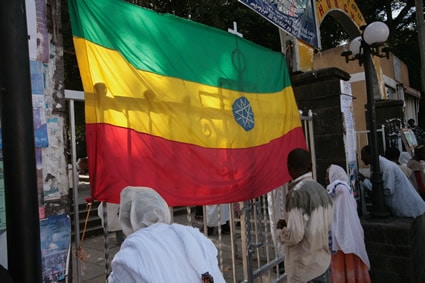
Country Director
Tsehaywota Taddesse joined our ministry as a program facilitator in 1998 and was subsequently promoted to program supervisor, program manager and then program director. In 2007 he became the partnership specialist for the Africa Region, and in December 2008 he was appointed country director.
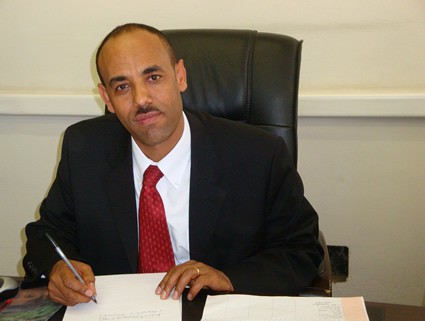
Before joining Compassion, Tsehaywota was asked by his church leaders to be a director for the child development center at his church. He served in that capacity for three years.
Tsehaywota was born and raised in rural Ethiopia and did not go to school until the age of 10. His father taught him to read and do simple mathematics, but he did not teach him to write. When the Ethiopian government started a literacy campaign all over the country, Tsehaywota had the opportunity to pursue modern education.
He holds a bachelor of science in geology from Addis Ababa University and a masters degree in child development from Daystar University in Nairobi.
Implementing Church Partners
Implementing Church Partners are local churches with whom we work to deliver our child development program and ministry in the field.
- Spiritual Climate
Islamic fundamentalism is growing in Ethiopia, which is threatening the Christian Church. There have been incidences of violence toward Christians from Muslims. Also, some in the Muslim community threaten other Muslims who register their children at Compassion’s child development centers by hindering them from using funeral services and isolating them from certain social activities.Coptic Christianity is the cause of some persecution of evangelical Christians in the northern part of the country. Some families have faced isolation from social activities and have even experienced physical abuse.
- Unique Challenges
Our Implementing Church Partners face several challenges unique to Ethiopia, including:- the existence of different languages within our country requiring translation of program implementation documents
- the need to go through denominational organizations to work with the local churches
- the constant rise in the number of highly vulnerable children
- limited financial capacity of the Implementing Church Partners
- limited availability and high demand for vocational schools
- Contributions
Implementing Church Partners take care of the office construction for development center administration as well as Sunday school classes and on occasion, latrines.Implementing Church Partners also assign volunteers for the child development center.
- Church-to-Church
Our church-to-church partnerships in Ethiopia are in the relationship-building stage at this time. Sponsoring Church Partners have held special events to bring more sponsors into the ministry, which has enabled the Implementing Church Partners to register more children. - Partner Development Activities
We develop partners in Ethiopia by delivering training, conducting needs assessments, making funds available through Complementary Interventions, and organizing advocacy and sensitization workshops.
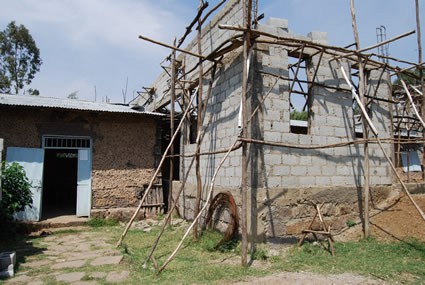
Child Survival Program
- Caregiver Literacy
Caregivers study literacy individually and in classroom settings of no more than 15 mothers at a time. We use a basic adult program developed by the regional educational department.This program has five components: alphabetical letters (in their local language), words, construction of sentences, simple mathematics and environmental science. The mothers attend class twice a week for four hours each day over six months.
- Income-Generating Skills
Mothers can learn knitting, cotton spinning (for cultural dresses), basket making and petty trading. All income-generating activities are practiced both at home and at the Child Survival Program where the mothers are encouraged to work in groups. - Health Care
Caregivers have access to immunizations and voluntary counseling and testing — a free program provided by the Ethiopian government to meet the Millennium Development Goals of reducing child mortality and improving maternal health.We cover health counseling for mothers at the Child Survival Program on a regular basis, as well as pre-natal care, delivery expenses, medical treatment for children under age 5, transportation costs, and a higher level of medical care in the case of complications during labor and delivery.
- Nutritional Support
All mothers are equipped with an income-generating skill and the necessary materials to be self-sufficient and provide for their families. The Child Survival Programs provide nutritional education and demonstrate how to prepare healthy, balanced meals.In addition, each caregiver receives monthly food items such as grains, cooking oil, flour, and milk and cereal for their babies.
- Involvement of Fathers
Fathers are the main source of income for families in Ethiopia, so they are generally very busy and cannot attend programs organized by the Child Survival Program.However, when we are able to find an available time for the fathers, the Child Survival Program workers will meet with both parents to discuss various issues related to parenting. This happens once a month.
- Transitioning Out of the Child Survival Program
We make every effort to prepare the caregivers, children and Implementing Church Partners for successful completion of the Child Survival Program and transition into Compassion’s Child Sponsorship Program after the caregiver and child achieve specific physical, cognitive, social-emotional and spiritual outcomes. - Areas of Expansion for the Child Survival Program
Over the past three years our emphasis has been on rural towns; we plan to open child development centers in Addis Ababa next.
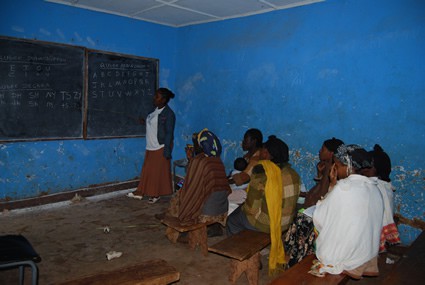
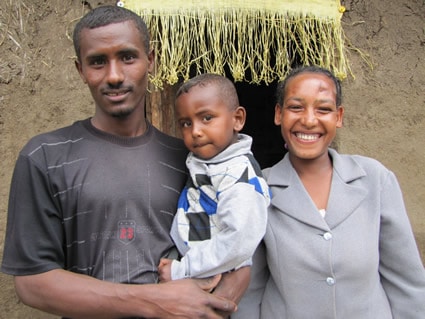
Child Development Through Sponsorship
Your sponsorship of a child in Ethiopia provides a variety of benefits.
The Implementing Church Partner’s facilities are used during the weekends for programs for adults, so sponsored children attend the Child Development Center during the week.
- Meeting Times:
- 3 to 5 year olds: 2 hours a day, four days a week
- 6 to 8 year olds: 2 hours a day, three days a week
- 9 to 11 year olds: 2 hours a day, three days a week
- 12 to 14 year olds: 2 hours a day, two days a week
- 15 to 18 year olds: 2 hours a day, two days a week
- 19 +: 2 hours a day, two days a week
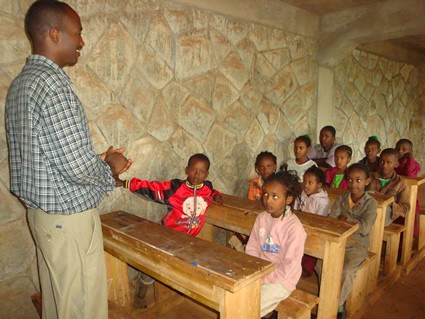
Implementing Church Partners do not provide food or nutritional support to the children at the child development centers because the government feels that doing so creates dependency.
In addition, because of the impoverished areas surrounding the Implementing Church Partners, they do not consider it fair to feed only the registered children while the rest of the children in the community do not have any food.
Children receive vaccinations free of charge at the public health clinics provided by the government.
Occasionally there are community service opportunities such as tree planting or environmental sanitation activities. Extracurricular activities such as sports are regularly available.
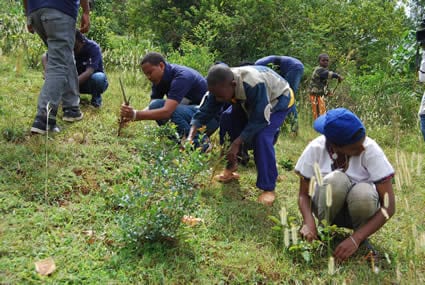
Most adolescents in Ethiopia do not have an opportunity to attend college because it is highly competitive. Vocational training enables the students to learn a practical skill and become economically self-supporting.
Adolescents participate in skills training and professional training depending on their area of interest and what is available. Students often become certified in the skill they are learning.
Implementing Church Partners make an effort to provide jobs to child sponsorship graduates, but there are a limited number of positions available at the child development programs. The government encourages micro-business by giving small shop spaces or small plots of land to those who organize themselves into a group and propose a specific business.
Some Implementing Church Partners try to facilitate these shop spaces or land plots for child sponsorship graduates who are trained in various vocational skills.
We have a monthly meeting for parents at the child development center. We discuss parenting as well as various issues raised by parents.
Parents also get involved in the planning and purchasing of items such as clothing and food grains for the children.
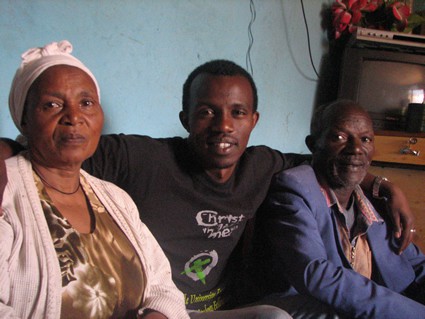
We would like to expand into the northern part of Ethiopia. This is an impoverished region with a high number of evangelical churches and committed church leaders.
Leadership Development Program
All of Compassion’s Leadership Development Program students attend government universities throughout the country. Students presently attend 23 of the 26 government universities in the country. Some schools are located in the capital while others are up to 700 kilometers away from the capital. Because of the help from the Leadership Development Program, none of the students have to work while attending university.
- Service Opportunities
Students participate in service opportunities mainly during their breaks from school. They assist at work camps, teach children at the child development centers, encourage parents in child rearing, speak to church elders and pastors about ministry, clean church compounds, assist the child development centers in whatever work needs to be done, evangelize adolescents, and paint church rooms.Leadership Development Program students are required to serve their local church and community for a minimum of 15 hours every two months. Their pastor sends a signed letter to the Leadership Development Program specialist explaining the type of service in which the student participates.
- Leadership Development Program Meetings
The larger Leadership Development Program group meets at least twice a year, between semesters or during long vacation breaks. They cover the Leadership Development Program curriculum topics, participate in service opportunities, and meet individually with the Leadership Development Program specialist. - Specialty Curriculum Topics or Resources
In addition to the 24 curriculum topics set by our ministry, Leadership Development Program students in Ethiopia take eight electives offered by college theology teachers. These electives include Old and New Testament survey and life skills courses. We feel it is important for the students to have a basic knowledge of biblical doctrine and to have an ample amount of Bible study time. - Mentors
We identify students who are not involved in a mentoring relationship and introduce them to the child development center staff in their area. Sometimes the center staff become mentors, and at other times they help the students find a mentor.We also network with the Evangelical Student Union of Ethiopia, which works with Christian university students. The regional coordinators assist new Leadership Development Program students in finding a mentor and many are mentors themselves.
- Leadership Development Program Alumni Group
There is a Leadership Development Program Alumni Association but it is not extremely active because the graduates are scattered throughout the country. Meetings and activities generally take place in the capital city where a few graduates live.However, students who are active are invited to different parts of the country to preach and teach at the child development centers. They also advise current Leadership Development Program students, and some graduates serve as mentors.
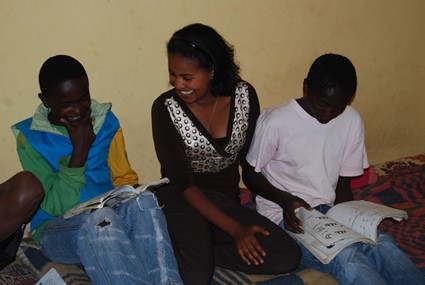
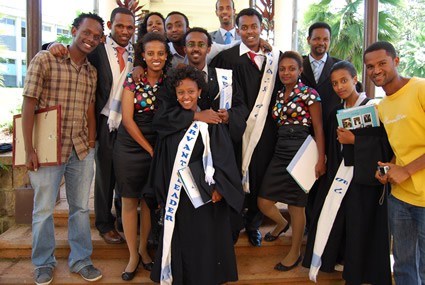
Complementary Interventions
Our core Child Sponsorship Program, while comprehensive, does not address all obstacles to a child’s healthy development.
Compassion’s Complementary Interventions program was created to provide additional services as needed, such as our AIDS Initiative, disaster relief, water projects, special medical intervention, and provision of Bibles to all Compassion-assisted children.
Complementary Interventions in Ethiopia include:
- equipping guardians with child care, business and income-generating skills and enhanced parental capacity
- providing pit latrines, playgrounds and classroom construction
- building and provision of educational resource centers such as libraries and computer rooms
Highly Vulnerable Children
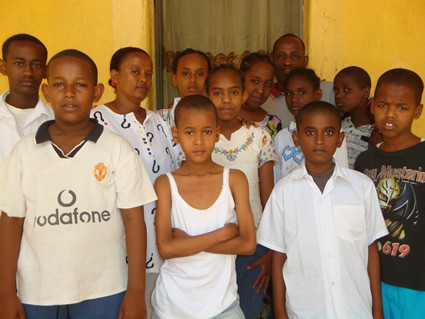
The needs of highly vulnerable children in Ethiopia include:
- Caregiver incapacitation: About 60 to 70 percent of registered Highly Vulnerable Children are living with sick, elderly or child guardians. They have serious physical, economic, nutritional and household needs. They need community-based care to cope with their living challenges and to attend programmatic activities. Highly Vulnerable Children funds allow children to remain in the Child Sponsorship Program and finish successfully.
- Caregiver deprivation: About 25 percent of registered Highly Vulnerable Children are without adult care and follow-up, resulting in a chronic need for foster families. We are working to find volunteer families who can accept these children into their homes and protect and provide for them in a sustainable way.
- Child abuse: About 5 to 10 percent of registered Highly Vulnerable Children encounter various forms of child abuse, resulting in emergency situations requiring immediate intervention.
- Disabilities and special needs: As we identify registered children who have physical disabilities, we take necessary action to help them remain in the program and finish well. We will also make efforts to mobilize the church and surrounding community to give support.
- Cottages: There are 35 children in six ministry cottages who are provided with proper family care and follow-up. We are working toward the sustainability of these cottages.


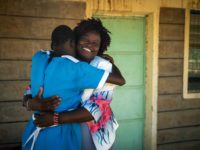




4 Comments |Add a comment
Compassion’s ministry in Ethiopia with the Child Sponsorship Program is reaching the marginalized and un reached parts of societies’ children, developing awareness against PANDEMIC COVID 19, not to be exposed and affect easily, with caring beside providing physical, spiritual, social, mental . . . needs, we promote and shared at our Easter message staying at home and one by on communication is global act to fight against the COVID 19.
Compassion’s ministry in Ethiopia with the Child Sponsorship Program is reaching the marginalized and un reached parts of societies’ children, developing awareness against PANDEMIC COVID 19, not to be exposed and affect easily, with caring beside providing physical, spiritual, social, mental . . . needs, we promote and shared at our Easter message staying at home and one by on communication is global act to fight against the COVID 19.
PLEASE TSEHAYWOTA BE SMART ON DEALING WITH PROJECTS
your work is awesome – we shared at our Christmas service yesterday.